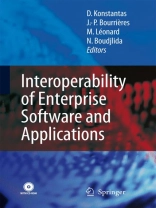Interoperability: the ability of a system or a product to work with other systems or products without special effort from the user is a key issue in manufacturing and industrial enterprise generally. It is fundamental to the production of goods and services quickly and at low cost at the same time as maintaining levels of quality and customisation.
Composed of 40 papers of international authorship, Interoperability of Enterprise Software and Applications ranges from academic research through case studies to industrial experience of interoperability. Many of the papers have examples and illustrations calculated to deepen understanding and generate new ideas.
A concise reference to the state of the art in software interoperability, Interoperability of Enterprise Software and Applications will be of great value to engineers and computer scientists working in manufacturing and other process industries and to software engineers and electronic and manufacturing engineers working in the academic environment.
قائمة المحتويات
Development of a Metamodel to Foster Interoperability along the Product Lifecycle Traceability.- Business Process Requirements, Modeling Technique and Standard: how to Identify Interoperability Gaps on a Process Level.- An Architecture for Semantic Enterprise Application Integration Standards.- Inter-Organization Interoperability in Transport Chains Using Adapters Based on Open Source Freeware.- MAFIIA — An Architectural Description Framework: Experience from the Health Care Domain.- ISO Standards for Interoperability: a Comparison.- ONAR: An Ontologies-based Service Oriented Application Integration Framework.- A Framework for Semantic Enterprise Integration.- A Framework to Support Interoperability among Semantic Resources.- Virtual Breeding Environment: Working and Sharing Principles.- Modeling and Using Business Collaborations.- Establishing Interoperability of Coordination Protocols in ad hoc Inter-Organizational Collaborations.- Ontology-based Interoperability Services for Semantic Collaboration in Open Networked Systems.- Interoperability through integrating Semantic Web Technology, Web Services, and Workflow Modeling.- An M3-Neutral Infrastructure for Bridging Model Engineering and Ontology Engineering.- Contract-based Interoperability for E-Business Transactions.- Interoperability Middleware for Federated Enterprise Applications in web-Pilarcos.- Customizable Isolation in Transactional Workflow.- Transforming Workflow Graphs.- Interoperability Issues in Metamodelling Platforms.- Towards Using UML 2 for Modelling Web Service Collaboration Protocols.- Quantitative Analysis of Enterprise Architectures.- Mapping Specification in MDA: From Theory to Practice.- Experiment in Model Driven Validation of BPEL Specifications.- Integrating Business Processes with Peer-to-Peer Technology.- Design and Implementation of a Peer-to-Peer Data Quality Broker.- Moving from Internal to External Services Using Aspects.- Methodology for the Definition of a Glossary in a Collaborative Research Project and its Application to a European Network of Excellence.- Ontology-based Semantic Interoperability Tools for Service Dynamic Discovery.- Identifying Business Components on the Basis of an Enterprise Ontology.- Using Connectors for Deployment of Heterogeneous Applications in the Context of OMG D&C Specification.- Development of an Integrated Retrieval System on Distributed KRISTAL-2002 Systems with Metadata Information.- A Domain Model for the IST Infrastructure.- Towards a New Infrastructure Supporting Interoperability of Information Systems in Development: the Information System upon Information Systems.- Design Solutions for Interoperability Using a Process Manager.- Towards an Interoperability Framework for Model-Driven Development of Software Systems.- Syndicate Data Incorporation into Data Warehouses: Contrasting Consumer Problems with Supplier Viewpoints.- Conformance Testing of Open Interfaces in Healthcare Applications – Case Context Management.- Interoperability Research in the European Union.- The Knowledge Web Network of Excellence.- Interoperability Contributions of Cross Work.- Networked Organisations — Research into Standards and Standardisation.- Methods for the Analysis of Supply Network Processes at European SMEs.- The INTEROP Network of Excellence.- ATHENA – Advanced Technologies for Interoperability of Heterogeneous Enterprise Networks and their Applications.- Terregov: e Goverment Interoperability on a Semantically Driven World.
عن المؤلف
Prof. Konstantas is the originator of the Object-oriented Interoperability concept, which placed the basis for the definition of interoperability issues between heterogenous Object Oriented systems and applications. He defined and implemented an inter-language interoperability support framework and proposed different services for object oriented interoperability support. He also worked in the design of applications with object oriented and agent systems, ranging from multimedia to medical applications, where the problems and issues related to interoperability were identified and different solutionswere opted. Today Prof. Konstantas works in the implementation of mobile health systems and services and is interested in the interoperability problems between divers information systems and services.
Prof. Bourrières, works in the models and methods for the use of production systems in modern manufacturing industries. In this context he is interested in the issues and problems related to the software and application life cycle management, where interoperability with new and emerging systems is of major importance. One of the objectives is the creation of unified model where the different issues coming from all levels of an industial system (machine level, management of the production site, multi-site management etc) and aggregation of the related information can be represented. The target being to allow the exchange of information and smooth operation at all levels of the IS.
Prof. Léonard is working in the development of Information Systems and the problems arrising from the interoperability of diverse (legacy) Information Systems. inthis direction he has developed M7, an evolutionary approach for Information System design, offering an environment of specification in a common formalism and capitalizes the various specifications in order to make them reusable. He also works in the Specification and implementation of highly configurable coordinationinformation systems with responsibility overlaping protocols on Workflow Information systems.
Nacer Boudjlida is a full professor at the University Henri Poincaré Nancy 1 (F) and a researcher at LORIA (Lorraine Laboratory of Research in Computer Science and Applications). As a professor, his lectures include the various facets of databases (DBMS, database design, distribution, architecture, administration and so on). As a researcher, his domain of interest includes process modelling and support, distributed and cooperative computing, semantic-based mediated architectures. He authored two books on databases and numerous papers on software systems integration and interoperability, on software process modelling and support, etc.












